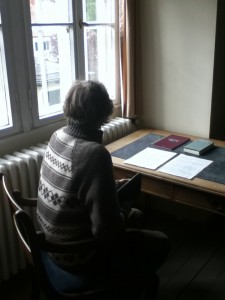Moving from Cheap to Costly Justice by Jeff Metcalfe
The Rev’d Jeffrey Metcalfe is the Incumbent of the Parish of the Magdalen Islands and Missioner for Communications, Diocese of Quebec, The Anglican Church of Canada
Justice: the word rolls off the tongue with hope, a feeling of moving forward, and maybe even a bit of righteous indignation. I have yet to meet a political party, a faith-based group, or a community of any kind that did not incorporate the word justice into the rhetorical fabric of its identity.
This creates an obvious problem for us as Christians. We may use justice in our mission statements. We may hang it on our structures like a vindicating shingle. We may even write letters or attend the occasional protests in an effort to substantiate our claims. But are we really living out the depth of God’s justice in our lives? What does our pursuit of justice actually cost us?

Photo by Larry Smith of Jeff Metcalfe sitting in the office of Dietrich Bonheoffer in Berlin. Bonheoffer, was a German Lutheran pastor, theologian, anti-Nazi dissident, and author of the modern classic The Cost of Discipleship who was executed for his staunch resistance to the Nazi dictatorship in 1945.
Around the time of the Second World War, when Christian’s were crafting and initiating intricate plans of mass murder, German theologian and pastor Dietrich Bonheoffer argued that the church had enabled these events to take place by making grace too easy. Grace had lost its depth. Grace had become cheap. “Cheap grace,” he famously wrote, “is the mortal enemy of our church. Our struggle today is for costly grace.”
Real grace costs us something. And so it is with justice.
I was reminded of this a few weeks ago during a recent social justice pilgrimage to Toronto. For ten days our parish brought ten teenagers from the Magdalen Islands—a remote community in the Gulf of the St. Lawrence—to downtown Toronto to be immersed in social justice issues the students had been studying. They spent the year following a family of Roma refugees in sanctuary, and then they met them. They learned about hunger and homelessness, and then they made friends with people living on the street. They watched a film about residential schools, and then they visited one.
Watching our students throughout this project was illuminating. While each student might have invoked the rhetoric of justice before the trip, it was not until they had met the people who were facing those struggles, became friends with them, played with their children, that the students’ rhetoric of justice moved from intellectual indignation into empathy; and from empathy into a commitment to help. It was also at that point that justice became costly.
As the students reflected on their week during a time of sharing and prayer, one student summed up what many were thinking:
Getting to know refugees, homeless people, and aboriginals has changed so many of my stereotypes. My whole life I’ve heard that these people are trying to steal our jobs, that they are criminals, drug attics, or lazy, and I believed it. But that’s not true. […] and here’s my problem: I know that now, but when I go home my family wont. They will continue to say racist and mean things, and it’s going to hurt me to hear it. But they are my parents and my grandparents. I feel like I can’t stay quiet about these things anymore, but I know its going to cause a fight in my family if I say anything about it. I need to do it, but it’s going to be hard.
Justice for the students had become costly, because as the students began to empathize with the struggles of those they learned to love, they began to see how all too often, the source of that injustice is not an outside enemy, it is the violence within ourselves, within our own families and histories. Confronting that kind of violence, pursing that sort of justice isn’t easy, it takes more then just rhetoric, it will cost us something.
Finally, I understand Jesus’ words:
Do not think that I have come to bring peace to the earth; I have not come to bring peace, but a sword.
For I have come to set a man against his father,
and a daughter against her mother,
and a daughter-in-law against her mother-in-law;
and one’s foes will be members of one’s own household.
Whoever loves father or mother more than me is not worthy of me; and whoever loves son or daughter more than me is not worthy of me; and whoever does not take up the cross and follow me is not worthy of me. Those who find their life will lose it, and those who lose their life for my sake will find it (Matthew 10:34-39).
Cheap justice is the mortal enemy of our church. Our struggle today is for costly justice.



